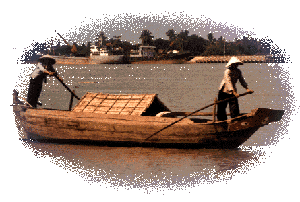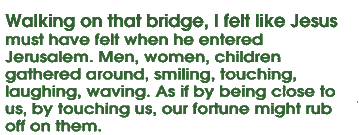|
Madonna, Marijuana, and Misery,
Saigon After the Fall, Part II
*****
The Mekong River is one of the world's great rivers, one whose
relationship with human civilization is as old and as intimate
as that of the Nile. 2600 miles long, its course takes it through
terrain as diverse as the civilizations that have risen and fallen
along its banks. It rises in the Tibetan highlands of the Chinese
province of Tsinghai, flows southward through eastern Tibet and
the western part of the Chinese province of Yunnan, then down
between Burma and Thailand on the west and Laos on the east, across
Kampuchea and through southern Vietnam where its wide muddy delta
finally spills it out into the South China Sea. That delta was
once one of the largest rice-growing areas in the world and still
remains Vietnam's agricultural mainstay. Always close to the ravages
and fury of the guerrilla war in southern Vietnam, the Mekong,
like Da Nang and Khe Sanh, has entered the vocabulary of the West
as one synonomous with horror. And death.
But, like Da Nang which boasts perhaps the most beautiful beaches
and the most unusual rock formations in Southeast Asia, the reality
of the Mekong reflects none of this. Although its upper reaches
are dominated by swift-flowing rapids and sheer canyons, by the
time the Mekong reaches Vietnam it is slow, broad, and indolent.
Rusting barges chug up and down the delta in fits and starts.
Ancient junks, their timbers bleached and rotten, list forlornly
against the jungle-shrouded banks. Dart-like family sampans, laden
with fresh fish, their thatched roofs making them look like roofed
kayaks, shear through the placid current carried only by the indefatigable
muscle-power of the wizened men and women who paddle them. Tiny
children play noisily in the mudflats while monkeys cheerfully
chase coconuts in the trees. And the river flows, as it has always
flowed, gently and inexhorably towards the sea.
On our third day in Vietnam, we went down the Mekong. We felt
like Martin Sheen as Willard in Apocalpyse Now, setting off in
search of the mysterious Colonel Kurtz, embarking on a danger-fraught
journey of self-discovery. We stared at the dense foliage lining
the banks, searching for tigers, gun emplacements, danger. But
our cruise was just a cruise. The sun beat down on our heads.
The muddy water glittered like gold. The boat chugged steadily
through the water, its wake churning behind us, its engine grinding.
We ate coconuts. We waved at passing sampans. We took pictures.
We sniffed the breeze and smiled at the glaring white-blue sky.
We watched the horizon broaden as the river widened into the sea.

After about 45 minutes, we tied up at a small jetty. Half a dozen
children squatted there, black shadows against the brilliant sun.
They watched us disembark, unmoving, their faces more serious
than curious. We were led along a wooden walkway through a kind
of fruit plantation to a roofed, open-walled structure. There
we were to have tea. The children followed, quiet and discreet.
After tea, we were taken back to the boat. Again the children
lined up on the jetty, solemn and silent. They didn't return the
friendly waves of the tourists, they ignored the snapping cameras.
They just sat there and watched, heads resting on their knees,
like miniature meditating monks.
We returned the way we had come. In the port, we went to the local
hotel. It was under renovation. Mr Nyuk told us that SaigonTourist
hoped to open it to tourists the following year. For now, it was
a restaurant. We had lunch there. It may have been the best meal
I have ever had in my life. Fresh grilled fish, greens, onions,
tomatoes, and the ubiquitous mint leaf. Wrapped in wafer-thin
rice paper and dipped in spicy fish sauce. Washed down with cold
Saigon Export beer. Mr. Nyuk showed us how to eat the food. We
offered him some. He declined. Since he was not a tourist, he
was supposed to eat soup at a separate table with the employees.
*****
Replete, we returned to Saigon. Then rendezvoused with the cyclo
drivers. 
"You wanna see the slum today?", Thac asked.
I looked around. At the cripples and beggars. The drawn and shriveled
faces. The tattered clothes. The boarded-up windows. The blackened
concrete. I smelled the garbage. The urine. The diesel fuel. The
rotten fish. The tar sweating from the macadam.
"It gets worse?"
"Oh yes."
I didn't really want to go. I have a problem with Third World
slums. I feel as awkward as a visiting Martian. And I don't know
what to to do. Should I hand out money? It won't go far. Should
I refuse to use wooden chopsticks? Should I become a foster parent?
Or a political activist? Should I go home and try to forget about
it?
We went to the slum. It wasn't a shantytown. The people live in
sampans. Thousands of sampans crowded under a bridge that crosses
the Saigon River. Lined from one end to the other with tiny stalls,
spread cloths, and haggard merchants selling dried fish, cheap
toys, and junk, the bridge serves as the business district. Walking
on that bridge, I felt like Jesus must have felt when he entered
Jerusalem. Men, women, children gathered around, smiling, touching,
laughing, waving. As if by being close to us, by touching us,
our fortune might rub off on them. Others ducked their heads,
looked away, as if we were there only to mock them. Rich tourists
enjoying a vicarious slice of misery.
The children gathered to pose for pictures. Older people smiled
shyly. We walked off the bridge like the Pied Piper of Hamelin,
with an army of shouting children trailing us.
*****
On our last day in Vietnam, we had to stay hidden in our hotel
until late afternoon when the car came to take us to the airport.
We probably weren't in any real danger - after all, we were tourists.
our presence officially sanctioned and registered - but it didn't
seem worth the risk. Our paranoia may have been unjustified, but
in Ho Chi Minh City paranoia is infectious and constant - whether
it is the quick nervous glance of the official guide as he palms
a pack of American cigarettes or the deep reluctance of the unofficial
guides to comment on how they think things have been going since
the revolution. Any conversation is always prefaced with the strict
injunction that it not be repeated. 
Here, in the waning days of the Cold War, the Soviet Empire already
starting to fracture in Eastern Europe, we all, tourists and residents
alike, still clung to the myth of the totalitarian Communist dictatorship,
whose suffocating embrace encompassed all and everything within
its domain, whose secret police lurked behind every sideways glance,
whose informers stole confidences even as they passed you a joint,
and whose ministers' piercing gazes penetrated even the squalid
backrooms of the flimsy junks that floated in the sluggish Mekong.
But it was just that - a myth. Hanoi's poverty and isolation had
long since weakened its hold on the once vibrant South, and Ho
Chi Minh City, though as decayed and decrepit as any abandoned
ruin, held concealed behind its crumbling facade the same energy
and spirit that had once made her the queen of France's southeast
Asian empire, the Pearl of the Orient.
The sharp-faced man who waited impatiently on the sidewalk across
from our hotel, his face all slashes and ridges, did not care
that he lived in a land where crime did not exist and where profits
were a form of oppression. All he cared about was selling us a
bundle of phony U.S. one hundred dollar bills. Failing that he
would be satisfied with the Canon T-90 35mm camera that Kelly
wore slung around her neck.
He was scary. His eyes were cold and hard. Our cyclo drivers fell
silent as he approached. Kelly, always amiable, chatted with him
about America, Vietnam, and the superior quality of Japanese electronics.
Sure, we could break a hundred dollar bill for him. But we'd have
to go back to our hotel to get the cash.
"Your wife talks too much," muttered Thac. "She get you killed."
The man didn't want us to go. "How about camera?" he snapped.
"I give you five hundred American dollar."
A legless boy, or man - he could have been 15, he could have been
40 - scooted by on a wheeled board, hissing, "Bad boy. Very bad
boy. You stay away from him. Bad boy."
We fled to our hotel, vaguely promising to meet the guy later
at the Saigon Tourist Bar.
Back at the hotel, we slouched in the faded elegance of the hotel
bar, drinking iced beer with a fat, redfaced German TV cameraman
who kept telling us how much worse things were in the North.
We couldn't imagine.
We saw her again at the airport in the line at the X-ray machine.
She was crying. We asked her what was wrong. She told us she was
Vietnamese. She had gone to Paris with her parents in 1975. Now
she was 22. She had come to Vietnam to visit her relatives. She
was appalled. Unable to endure the conditions her family lived
under, she had moved into the hotel, going out to visit them when
she could bear it.
She kept crying. In both French and English, she cursed the skinny,
hard-faced soldiers who lounged casually around the airport cradling
their automatic rifles.
"My God," she said, her face damp with tears. " What have they
done? If this is what they have done to my country in ten years,
in another ten years there'll be nothing left."
She was still crying as the plane lifted into the air and Vietnam
fell away beneath us.
*****
|



![]()